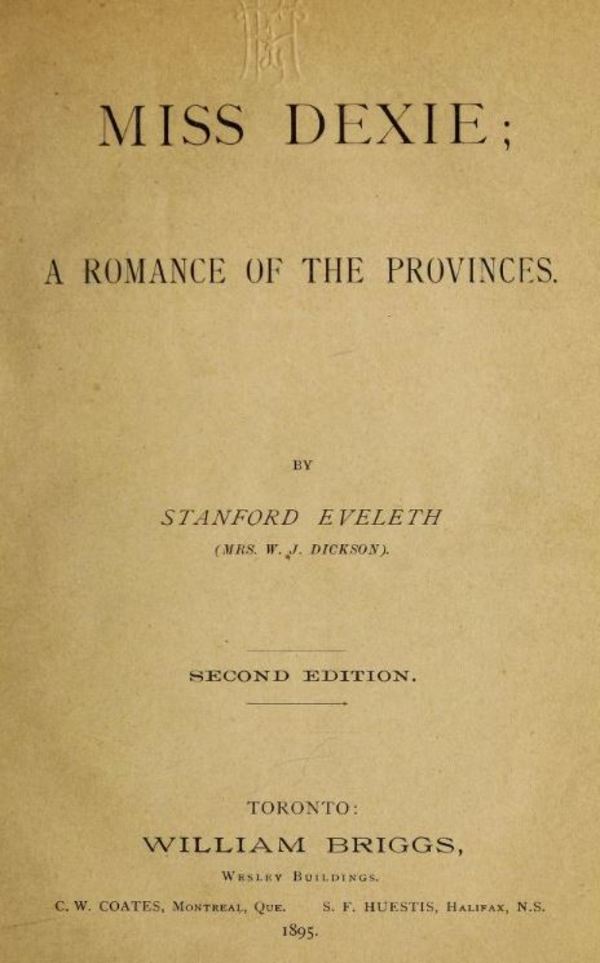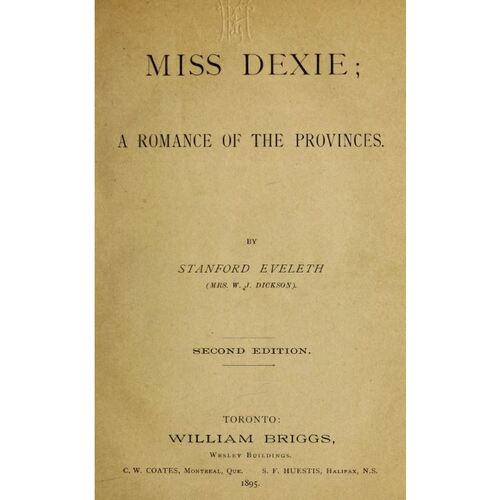
Source: Link
WELLS, EMMA LUCY (Dickson), novelist; b. 21 Nov. 1854 in Nova Scotia, daughter of Stanford Wells and Alvira ———; m. 11 Jan. 1872 William John Dickson in Truro, N.S., and they had five surviving children; d. 19 March 1926 in Dartmouth, N.S.
Reputedly born in Truro, Emma Wells seems to have spent her early years in Maine and then in Prince Edward Island, where in 1864 her father owned a marble works in Charlottetown. After receiving a common school education on the Island, she moved to Truro with her parents; subsequently, her father was variously described as a “self acting hand loom manufacturer” and a mason. At 17 she married William Dickson, a man ten years her senior, who by 1881 had ceased being a pattern maker and had become a conductor on the Intercolonial Railway. In July 1896 Emma Dickson moved to Halifax. Newspaper notices on the death of her daughter Bertha on 24 Aug. 1897 would suggest that by this time the entire family had relocated.
With the publication in 1895, by William Briggs in Toronto, of Miss Dexie, a romance of the provinces, a novel written under the pseudonym Stanford Eveleth, Dickson had begun to achieve public attention. Although drawing on the Maine, Halifax, and Prince Edward Island settings of Dickson’s own background, Miss Dexie bears similarities to Louisa May Alcott’s Little women in its Civil War time-frame, its independent female protagonist (“One does not need to be born a boy to be of use in this world . . . for in all things that he needs help, I am my father’s boy.”), its abortive romance with the boy next door, its androgynously named heroine (Dexie for Dexter), and its stress on a close family circle. However, Dickson introduced her own distinctive touches to these conventions, particularly in her integration into her tale of train travel, Halifax social life, the worship of the Prince Edward Island McDonaldites [see Donald McDonald*], and the Victorian redesign of the kitchen. Toronto’s Saturday Night of 6 April 1895 praised the novel for its “well drawn character” of Miss Dexie, its exposure of selfish behaviour, and its humour (for example, a naive, intoxicated potato farmer from the Island mistakes the train’s passenger car for a chapel, the seats for pews, and the conductor for the sexton). Quoting Dickson on 22 June that she had found it necessary to marry off her heroine “as if marriage were the chief end of woman,” Saturday Night indicated that a sequel was planned if the novel was a success. By the end of November it had reached a third edition and had also been reviewed by the Toronto Week, the Portland Transcript (Portland, Maine), the Orillia Packet (Orillia, Ont.), the Christian Guardian (Toronto), and the Halifax Herald. Available in cloth at $1.00 and paperback at 50 cents, it continued to be bound by Briggs in runs of 100 paper and 100 cloth until 16 Feb. 1907, when the account was closed.
Dickson’s description of a McDonaldite church service forms one of the most lively sequences of the novel and, according to Saturday Night, “brought down upon her head the wrath of the congregation.” It was followed on 7 Dec. 1895 by an article in this magazine, “The Jerkers,” based on Dickson’s visit to a McDonaldite service at Birch Hill, near Pownal, P.E.I., in September. Expressing her disapproval that such evangelical leaping, twirling, and waving was allowed, she none the less created a vivid image of her subjects, writing of one participant, “Turning again, with both arms she salaamed toward the wind-bag in the pulpit, then curveting around she went through the same performance for the benefit of those in the rear, all the while her feet and body being in rhythmical motion.” An article on “The new man” in the Halifax Herald Woman’s Extra on 10 Aug. 1895 had struck an equally acerbic note when Dickson predicted that the “new woman” would prefer single life until such time as the “new man” had evolved enough to ensure both her individuality and her right to make choices about motherhood.
Dickson reputedly wrote children’s stories as well as adult fare, but she seems to have disappeared from literary view in the late 1890s. Active in St Paul’s Church in Halifax and in charitable pursuits until she became an invalid towards the end of her life, she died in 1926, three years after her husband. Her obituary in the Halifax Morning Chronicle described her as “a firm believer in British Israel, and a student of the prophetic writings,” but made no mention of her literary output. Yet the lively dialogue, humorous play, and intelligence of her heroine in Miss Dexie all reflect her considerable adeptness at writing popular fiction.
NA, RG 31, C1, Truro, N.S., 1871, 1881, 1891; 1901, Halifax, subdist.E, subdiv.4: 7. NSARM, Churches, St Andrew’s United (Truro), reg. of marriages, 11 Jan. 1872 (mfm.); St John’s Anglican (Truro), reg. of burials, 1897 (mfm.); RG 32, WB, Colchester County, no.29/1872. UCC-C, Fonds 513/1, 83.061C, vols.43–44. Halifax Herald Woman’s Extra, 10 Aug. 1895. Morning Chronicle (Halifax), 19, 22 March 1926. “‘A romance of the provinces,’ from the Christian Guardian, Toronto,” Halifax Herald , 22 Nov. 1895: 8. Truro Daily News, 26 Aug., 1 Nov. 1895; 20 July 1896; 25 Aug. 1897. Canadian men and women of the time (Morgan; 1898). M. B. DesBrisay, History of the county of Lunenburg (2nd ed., Toronto, 1895; repr. Belleville, Ont., 1980), advertisement, “Some well-known writers of or from the Maritime provinces and their books,” in the end-papers. Directories, Halifax, 1897/98: 198; 1898/99: 209; 1900–1; N.S., 1871: 376; P.E.I., 1864. Saturday Night (Toronto), 6 April, 22 June, 7 Dec. 1895.
Cite This Article
Gwendolyn Davies, “WELLS, EMMA LUCY (Dickson),” in Dictionary of Canadian Biography, vol. 15, University of Toronto/Université Laval, 2003–, accessed January 1, 2026, https://www.biographi.ca/en/bio/wells_emma_lucy_15E.html.
The citation above shows the format for footnotes and endnotes according to the Chicago manual of style (16th edition). Information to be used in other citation formats:
| Permalink: | https://www.biographi.ca/en/bio/wells_emma_lucy_15E.html |
| Author of Article: | Gwendolyn Davies |
| Title of Article: | WELLS, EMMA LUCY (Dickson) |
| Publication Name: | Dictionary of Canadian Biography, vol. 15 |
| Publisher: | University of Toronto/Université Laval |
| Year of publication: | 2005 |
| Year of revision: | 2005 |
| Access Date: | January 1, 2026 |



